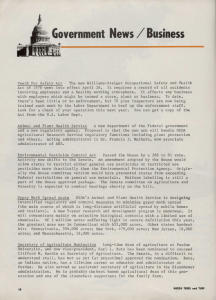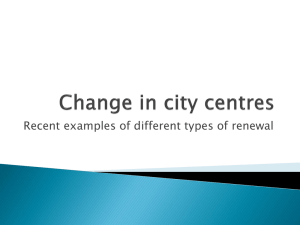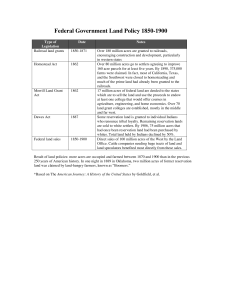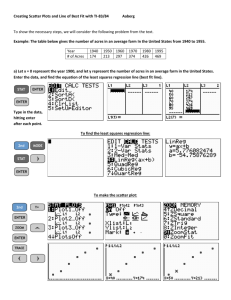Needs Assessment - Michigan State University
advertisement
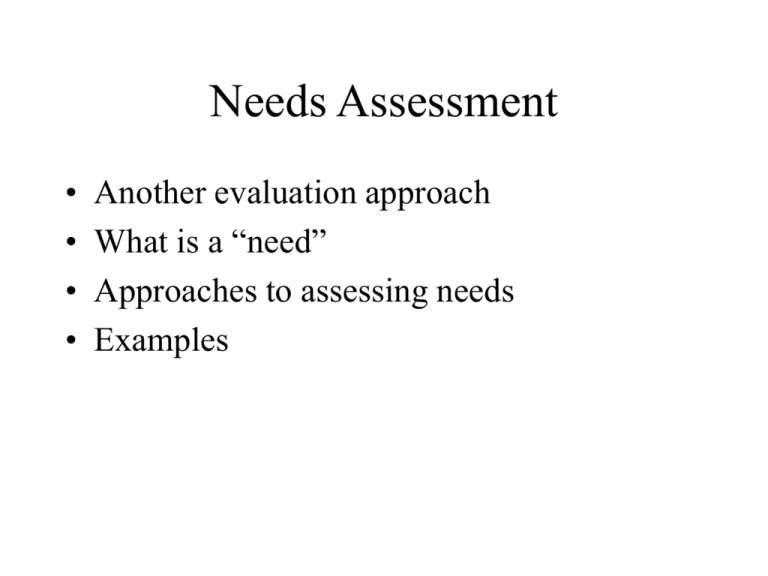
Needs Assessment • • • • Another evaluation approach What is a “need” Approaches to assessing needs Examples “I need a thneed”, • • • • Like/Dislike, Preference Need vs Want Demand Willingness vs Ability to Pay the Lorax Need = difference between what someone wants and what exists Applied mostly to public programs Often in context of resource allocations across target populations or regions Relative needs - indices, priorities "need" is a value judgement that some group has a problem that can (should) be addressed. Whose value judgement? • normative need - an experts opinion, • felt need - client self-assessment, • expressed need -(behavior)- use or non-use of services/facilities), • comparative need -relative to a reference or peer group. Kinds of Needs • Outcomes not equal expectations (standards) • At risk : groups whose conditions put them at greater risk of problems • Maintenance needs, e.g alcohol/drug rehab, fitness, health Steps in Needs Analysis • Identify users and uses of the study – why? • Describe target population (who?) and service environment • Identify Needs – assess relative importance • Propose alternatives for meeting needs • Evaluate alternatives – Feasibility, effectiveness, costs • Communicate results/Implement Three Models • Discrepancy (gap) = desired - existing – Goal setting - what we want – Performance measurement - what is – Discrepancy identification • Marketing - determine needs and wants of target markets and assess ways (4P's) of meeting them – Select target markets – Choose competitive position – Develop effective marketing mix • Process/Root Causes vs Symptoms Ex.1: SCORP Approach – recreation needs • • • • Measure supply of facilities in a region Measure “Demand” or desired use Difference = Need Forecast Future Supply or Demand to assess future needs • Possibly rank needs by priority/importance Ex 2: NRPA Open Space Standards for Communities • 10 acres of parkland per 1000 population • 10% of land area in parks • $8 operating expense per capita Problems with Standards • • • • Minimums, Maximums or Ideal? Must be revised to fit local situation Origin usually dubious Tend to become performance measures rather than guidelines • Often misused Ex 3. Community Needs Survey or Market Survey • • • • Qualitative or Quantitative Attitudes or Behavior Objective or subjective measures Direct or Indirect Approaches – What are your needs? – perceived needs – Measure/observe behavior & compare with a norm Michigan SCORP 1985 User-Oriented Facilities Opportunity Local park acres Outdoor pools Golf courses Outdoor BB cts NRPA Standard 10/1,000 1/40,000 .5/25,000 1/5,000 State Avg. 6.25 .47 1.26 1.05 Plan Std. 10 1 1 1 MI Local Park Acres- 1985 County Acres Alcona 316 Allegan 277 81,471 3.40 539 0.34 Ingham 3,183 276,783 11.5 0 1.15 91 66,912 1.36 577 0.14 Van Buren Popln Acres/ Need Per 1K (acres) 9,753 32.4 0 Need Index 3.24 Wayne 11,299 2,339,337 4.83 12,080 0.48 State 57,877 9,260,320 6.25 35,000 0.63 Activities Analyzed at Regional level • • • • • • Boat launches Campgrounds Trails - XC , hiking, ORV, snowmobile Fishing access Nature areas Beaches LWCF • 1958-1962 – ORRRC • 1964 – LWCF act – – – – – Funding for federal land acquisition State matching grants Planning, acquisition & development SCORP plans 1978- UPARR Central Cities 10/acres/1000 Port Arthur, TX Phoenix, AZ Columbus, OH Lansing, MI San Diego, CA Minneapolis, MN Cincinatti, OH 70.1 45.6 17.9 15.2 13.3 11.8 10.7 Central Cities 10% of Land Wheeling, WV Phoenix, AZ Columbus, OH Lansing, MI San Diego, CA Minneapolis, MN Cincinatti, OH 23.6 19.9 17.0 14.5 13.3 15.2 10.8 Central Cities $8 Operating per capita Wheeling, WV Santa Barbara, CA Columbus, OH Lansing, MI Atlanta, GA Los Angeles, CA Minneapolis, MN 37.36 15.43 12.59 9.82 10.12 9.50 8.09 Meeting all 3 City Wheeling, WV Portland, OR Columbus, OH Lansing, MI Indianapolis, IN Minneapolis, MN Acres/1000 % Land 32.6 19.5 17.9 15.2 13.7 11.8 23.6 17.3 17.0 14.5 16.0 15.2 Operating 37.36 10.40 12.59 9.82 13.78 8.09
